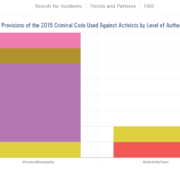Human Rights Recap for May 17th-May 31st, 2014
Cu Huy Ha Vu, a former Vietnamese prisoner of conscience who recently moved to the United States, wrote a piece for the Washington Post about the current state of human rights and freedom of expression in Vietnam. In the article, he cites that there are 400 prisoners of conscience in Vietnam today.
He states that though international pressure for prisoner releases is well-intended, Vietnam often uses the prisoners as “commodities” that can be used as leverage against the US and other world powers. This facet of Vietnamese government behavior is of particular concern as Vietnam negotiates the Trans-Pacific Partnership and continues to be regarded as an up-and-coming economic player.
Read Cu Huy Ha Vu’s full article: wapo.st/1gbGT16
As Vietnam is continually pushed into the spotlight due to the current Vietnamese-Chinese tensions, the larger issue of the South China Sea, and the recurrent negotiations over the TPP, it is our hope that Vietnam’s human rights abuses will be brought out into the spotlight as well. However, it is becoming clear that pressure from international bodies and lawmakers is not enough to fundamentally change the behavior of the Vietnamese government.
In order for any real positive change to take place, Vietnamese prisoners of conscience and activists must not be viewed as bartering chips, and Vietnamese human rights abuses must not be tolerated by any measure, even if Vietnam has taken favorable actions in other areas. The United States may need to take a more hardline approach to its relationship with Vietnam.
President Obama just nominated a new US Ambassador to Vietnam, Ted Osius. This nomination– along with the rising tensions between many Vietnamese and Chinese groups– will be a key transition period that will shape not only Vietnam-US relations, but also China-US relations and the US presence in SE Asia, for better or for worse.
With several US policymakers already supporting imprisoned Vietnamese activists, the time is ripe to re-examine US and Vietnamese ties. Cu Huy Ha Vu recommends a course of action: repealing Articles 79, 88, and 258 of Vietnam’s Penal Code, under which, his article says, two-thirds of known prisoners of conscience in Vietnam are imprisoned.
Act.
English PEN has actions for Le Quoc Quan and Nguyen Xuan Nghia, two very influential imprisoned writers in Vietnam.
Watch Member Anthony Byrne’s speech to the Australian Federal Parliament.
To read more about these stories from their original sources, follow the links within the text.
@The88Project


